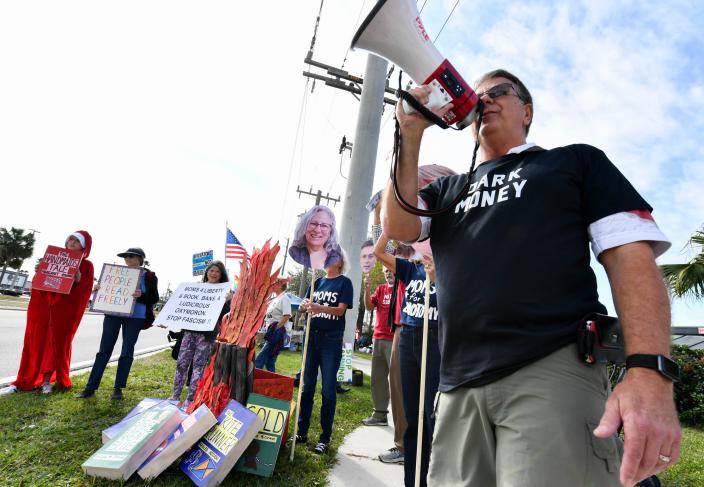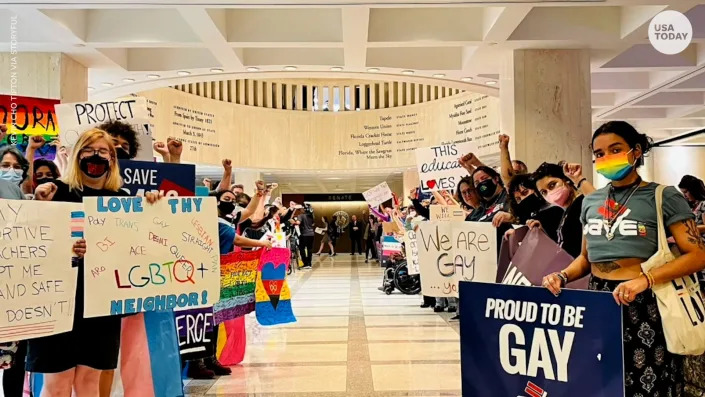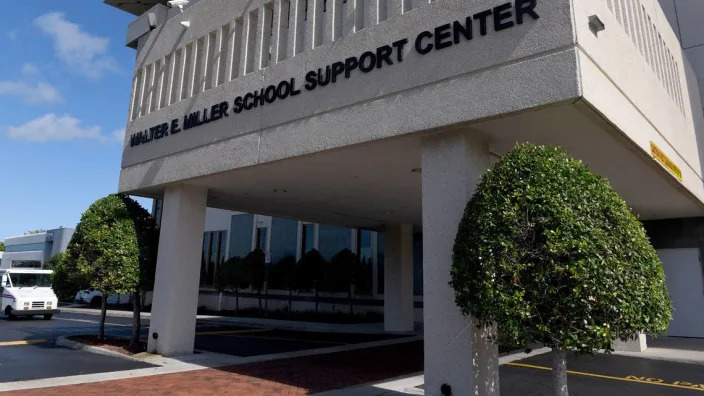Weaponizing higher education is DeSantis' newest trick
Danielle DeLaney
Sun, January 29, 2023
The war on public education continues, and Ron DeSantis is making certain that everyone knows Florida is ground zero for overhauling the way our students learn. First, he installed former Senator Ben Sasse (R-Nebraska) as president at the University of Florida. Starting Feb. 6, Sasse will be paid $1 million in base salary for five years, plus a raise of up to 4 percent. A bonus after five years could add another $1 million to the former senator's paycheck.
DeSantis then announced his targeted, surgical attack on the 62-year-old New College of Florida in Sarasota, a small public college that continuously ranks in the top ten in Public National Liberal Arts Colleges (currently #5) by U.S. News & World Report. It is a "Best Value College" by the Princeton Review and a "Best Buy College" by Fiske Guide. It is considered one of America's best colleges for student voting by Washington Monthly. Fortune Magazine ranks New College of Florida a Best Master's in Data Science. Yet the governor wants to bring in a wrecking ball to New College and make it a "Hillsdale of the South" to give conservative families an option for higher education in Florida.
Hillsdale is a private, religious school in Michigan. Hillsdale's president, Larry Arnn, was recorded (with Governor Bill Lee of Tennessee saying "Teachers are trained in the dumbest parts of the dumbest colleges in the country. The heart of modern education is enslavement." Arnn is chairperson of the 1776 Commission, the advisory board that seeks to overhaul the nation's schools with a whitewashed "patriotic education."
Danielle DeLaney
Sun, January 29, 2023
The war on public education continues, and Ron DeSantis is making certain that everyone knows Florida is ground zero for overhauling the way our students learn. First, he installed former Senator Ben Sasse (R-Nebraska) as president at the University of Florida. Starting Feb. 6, Sasse will be paid $1 million in base salary for five years, plus a raise of up to 4 percent. A bonus after five years could add another $1 million to the former senator's paycheck.
DeSantis then announced his targeted, surgical attack on the 62-year-old New College of Florida in Sarasota, a small public college that continuously ranks in the top ten in Public National Liberal Arts Colleges (currently #5) by U.S. News & World Report. It is a "Best Value College" by the Princeton Review and a "Best Buy College" by Fiske Guide. It is considered one of America's best colleges for student voting by Washington Monthly. Fortune Magazine ranks New College of Florida a Best Master's in Data Science. Yet the governor wants to bring in a wrecking ball to New College and make it a "Hillsdale of the South" to give conservative families an option for higher education in Florida.
Hillsdale is a private, religious school in Michigan. Hillsdale's president, Larry Arnn, was recorded (with Governor Bill Lee of Tennessee saying "Teachers are trained in the dumbest parts of the dumbest colleges in the country. The heart of modern education is enslavement." Arnn is chairperson of the 1776 Commission, the advisory board that seeks to overhaul the nation's schools with a whitewashed "patriotic education."
It's important to note that the 1776 Commission's vague language insists that George Washington freed his slaves at the end of his life. Not true: Of the 317 enslaved people at Mount Vernon at the time of Washington's death in 1799, 123 were owned by Washington and eligible to be freed after the death of his wife, Martha (this was per the terms of his will). The Washingtons had no legal authority to emancipate the slaves owned by the Custis estate portion of Mount Vernon, and those enslaved people were inherited by Martha Washington's grandchildren after her death.
The 1776 Commission also claims that Dr. Martin Luther King Jr. opposed affirmative action. Again, not true: as chair of the Southern Christian Leadership Conference, Dr. King initiated Operation Breadbasket, the first successful national affirmative action campaign. Apparently, lying to our children is the GOP's plan for public education, only now, it extends from K-12 to the collegiate level.
Conservative families have always had plenty of options. The governor himself is a conservative who chose to attend an Ivy League school that appeals to conservative, liberal, and progressive students. His own education did not sway him to become liberal nor progressive. If his Ivy League education didn't "indoctrinate" him in liberal or progressive ideology, why is he scared that higher education in Florida will "indoctrinate" conservative students to become progressive or liberal?
I am reminded of former President Trump's quote: "I love the poorly educated." DeSantis has twisted the mission of New College, claiming it needs to be "fixed" because it doesn't provide a quality education — an attack on the diversity, equity, and inclusion mission that all Florida public colleges and universities held until this past week when DeSantis continued his assault on higher education for daring to include people from all walks of life — not just heterosexual white Christians.
The person DeSantis has tapped to lead the change at New College of Florida is Christopher Rufo. Rufo was plucked from virtual obscurity when he started the culture war on critical race theory (CRT), while also admitting that he did not know nor did he care to learn what it is. How's that for education?
Ironically, Rufo could likely learn from the daughter of our state senator, Kathleen Passidomo. Dr. Catarina Passidomo's master's thesis in Environmental Anthropology at the University of Georgia (Athens) investigated social capital within a network of local food producers. Her dissertation from UGA in Human Geography was the "Right to (feed) the city: Race, Food sovereignty and food justice activism in post-Hurricane Katrina New Orleans." Among the classes that Dr. Catarina Passidomo teaches at Ole Miss: Southern Studies, which examines race/racism. Dr. Passidomo teaches this in Mississippi.
This is the exact type of class that Rufo and DeSantis would eliminate from public education across the state, and yet the president of the state Senate has a daughter who teaches this exact topic, knowing it poses no threat to the existence of white students. Surely Kathleen Passidomo sees the irony in this and the value of what her own daughter teaches Ole Miss students. Passidomo must recognize that if the governor's plan moves forward, then it will be the first domino that will fall in a long line on top of her own child?
In May, my son graduated Gulf Coast High School in Naples with a GPA well north of 4.0. By the end of ninth grade, he had amassed 80 hours of volunteer service work to go toward his Bright Futures Scholarship (students need 100 hours by the time they graduate high school). In addition to being in the engineering academy, he also took coding classes all four years of high school. He has a neck full of awards from winning various Science Olympiad competitions. Additionally, he took so many AP classes and scored high enough on the college board exams that he earned more than a year's worth of college credit. He is intellectually curious and genuinely enjoys learning about a variety of topics. He could never pick a favorite subject during K-12. At New College of Florida, he has found a small, tight-knit community of self-motivated, like-minded thinkers. He wants to use computer coding and artificial intelligence to help improve the lives of those with neurological deficits. New College can help him bring those areas of focus together in a single major so he can continue on with studies at the graduate level (which, if this attack on education continues, will happen outside of Florida).
While in their first semester of college, my son's friends at UF were taking computer classes repeating tasks they had done as ninth graders. My son was learning new object-based languages and how to apply real-world frameworks and systems to collate and organize data in a commercially usable format. How? Because he was able to demonstrate competency in those basic skills: He didn't need to repeat them and grow bored like his counterparts at UF who were skating through skills they already knew inside out; cookie-cutter computing, if you will. New College of Florida's courses challenge the student who wants to chase knowledge — not a GPA. My son receives no grades at New College. That doesn't mean it's easy. Rather, he receives detailed feedback in the form of written evaluations throughout his courses; undergraduates are treated as if they are already in graduate school. If he doesn't demonstrate proficiency, he doesn't get credit for the class. Professors are invested in their students' success, and students are accountable for their work. If anything, New College's format is more rigorous than other colleges in the state.
It's clear DeSantis hasn't spent any quality time inside the classrooms at New College of Florida to see for himself what these students are learning: he's picking his fight with New College because it is small; he didn't expect people to be outraged by what's been labeled his "hostile takeover" of a jewel in the state university system.
My son's peers at New College are similar in that they are self-motivated to learn, ask questions, and come up with solutions. My son is friends with people from all over the country as well as international students. Many are gay/trans, heterosexual, and others are still figuring it out. We're talking about young people in their late teens and early twenties.
Those of us without outside interference had the opportunity to figure out who we were and carve out a place for ourselves in life at that age. These young people deserve the opportunity without the governor interfering.
I remember when the GOP was the party of small government. Yet here they are, with DeSantis trying to force feed his deeply personal, bigoted agenda down our throats. After all, DeSantis himself has said that Florida is freer than it has ever been.
I was born here, and this is the scariest time to be a Floridian. The attack on New College of Florida and the university system in general should be a shrieking wakeup call to everyone: this is not about educational philosophy. It's about making headlines as DeSantis paves his way toward the 2024 presidential run, and those who are in college right now happen to be in front of the paver.
Let's just pretend for a moment that this is about educational philosophy. DeSantis wants a Hillsdale of the South? Fine. Build one from scratch, from the foundation up, the way Florida Poly was established in 2012 in Lakeland.
I'm sure there's another community that would welcome the economic benefits that a Hillsdale type public school would bring to it. Don't let the governor destroy New College of Florida. If they are successful in overhauling New College and DeSantis becomes president, then what they do at New will become the blueprint for higher education throughout this country. Your child or your grandchild's education is on the line.

Danielle DeLaney
A native of Miami Beach, Danielle DeLaney graduated from the University of Tennessee with bachelor's degrees in English and journalism. She worked in both government and private sectors as a researcher and technical editor. DeLaney lives in Naples with her husband of 30 years, David. Their son attends New College of Florida.
This article originally appeared on Fort Myers News-Press: Weaponizing higher education is DeSantis' newest trick
Sofia Ali-Khan, Lexi Allen, Grant Balfour, Anne-Laure Grignon and Trina Sargalski
Fri, January 27, 2023
“You could never get away with that at New College.”
This comes to mind as dismayed professors sound the alarm over students using Chat GPT, an artificial-intelligence program, to write papers.
The rigorous educational model at New College stands in stark contrast to concerns over students using technology to coast through their education. The number of one-on-one or small-group interactions with academic all-star professors at New College — in which students analyze and critique academic topics — would quickly reveal the lie in any AI-aided essays.
Florida Gov. Ron DeSantis recently appointed six members to New College’s board of trustees, with the stated aim of turning the college into the “Hillsdale College of the South.” Some of the new trustees have manufactured a story about New College as part of this politically motivated campaign.
The gap between New College and Hillsdale is vast, raising concerns that DeSantis will sacrifice a valued institution of public education for a crass political agenda. Hillsdale College is a private, Christian college with an annual tuition more than four times that of New College. It represents an extreme version of private education, declining all federal funding and even prohibiting its students from receiving federal financial aid in order to avoid standard oversight, such as reporting the racial makeup of its student body.
At New College, a public honors college, personalized education, critical thinking and rigorous academics are central pillars of the experience. Primary texts are favored over textbooks. Narrative evaluations or other more in-depth metrics are preferred over multiple-choice tests, for example. Students must complete a senior capstone project or senior thesis based on their coursework. Undergraduates defend their projects to an audience of professors and peers to get their degrees. New College makes an Ivy League-level education accessible to many students in Florida.
We attended New College at various times during the past 40 years. The common thread in our education was the focus on academic rigor and critical thinking. Among us are a marketing communications executive and entrepreneur, an editor, a lawyer, an ESL teacher and a doctor. For several of us, New College’s undergraduate demands matched or exceeded the difficulty of achieving a master’s degree.
Another common thread was being allowed the flexibility to develop our passions and points of view. Trina Sargalski got small business experience as part of a team creating the initial business plan for the Four Winds Coffeehouse.
Lexi Allen valued traveling to Guatemala to produce a documentary on indigenous art during her time at New College. Later, she worked with her academic sponsor to design her own course centered around editing, translating and framing this documentary.
Anne-Laure Grignon defended two theses in her separate tracks of study: biology and French. The double major allowed her to be more balanced and, as a doctor, she focuses on ALS research at the University of Miami.
At a recent meeting at the New College campus for students and faculty, the trustees were well-spoken but provided little information. One, Christopher Rufo, the Manhattan Institute propagandist, recently mentioned improvements he’d like to make, including returning the school to a “classical liberal model.” What is more classically liberal than studying Latin with primary texts? Than having open and analytical discussions across disciplines with no agenda beyond finding the truth?
The trustees’ manufactured political campaign threatens to upend the lives of New College students and faculty, and dismantle a uniquely successful model of higher education. We should all care — this is an attack on public and liberal-arts education.
We want our own kids to have the freedom to learn, to be themselves and to grow up healthy and safe. We want them to have access to quality public education that is accessible to a diverse group of students across Florida. But a handful of politicians are stoking Floridians’ fears, putting their desire for political power over students’ futures.
Floridians must speak up and take action to protect Floridians’ access to public education unfettered by political agendas.
Sofia Ali Khan (1992), Lexi Allen (2011), Grant Balfour (1986), Anne-Laure Grignon (2005) and Trina Sargalski (1995) are alums of New College of Florida. Learn more at @savenewcollege on Instagram and Twitter.
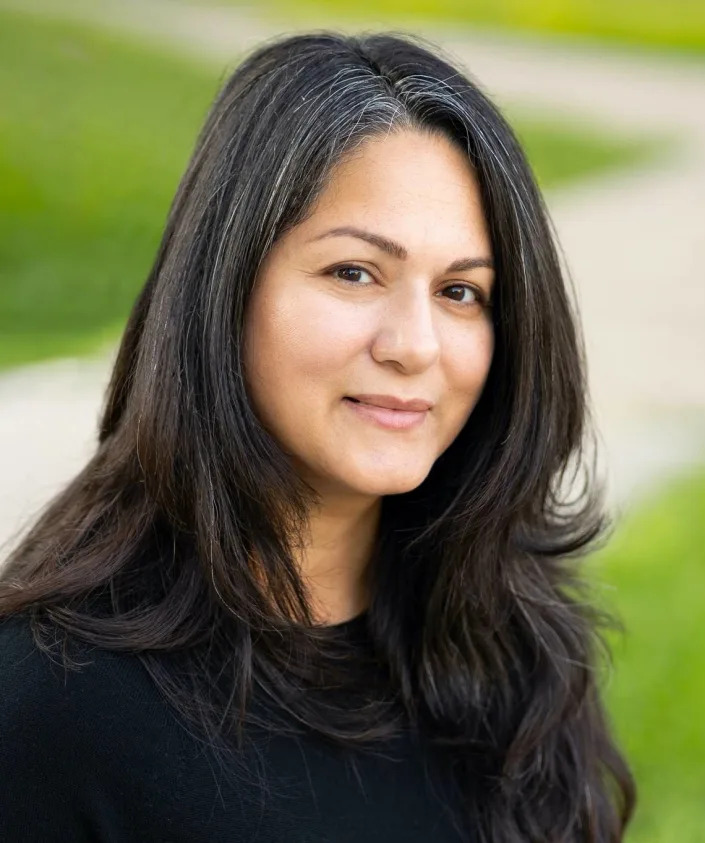
Ali Khan

Allen

Balfour
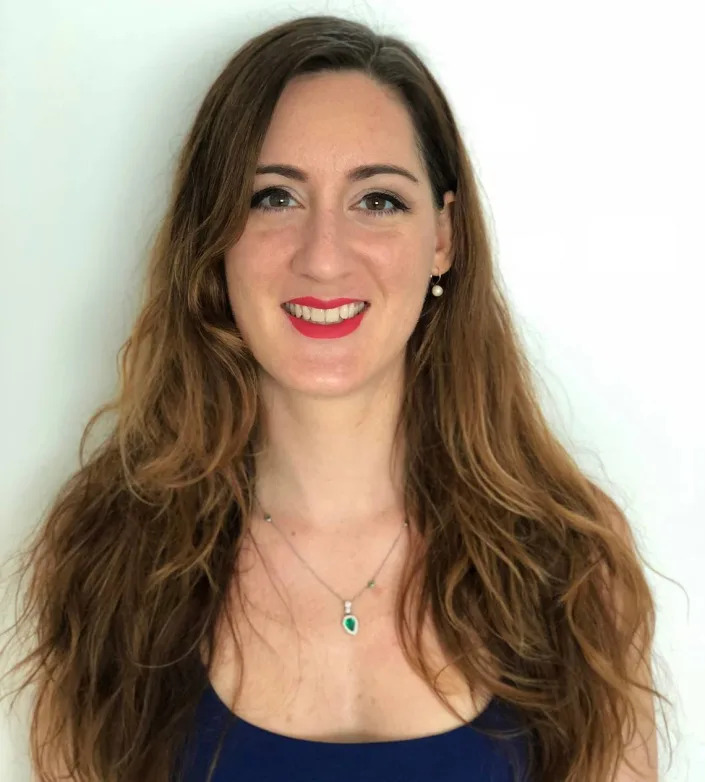
Grignon
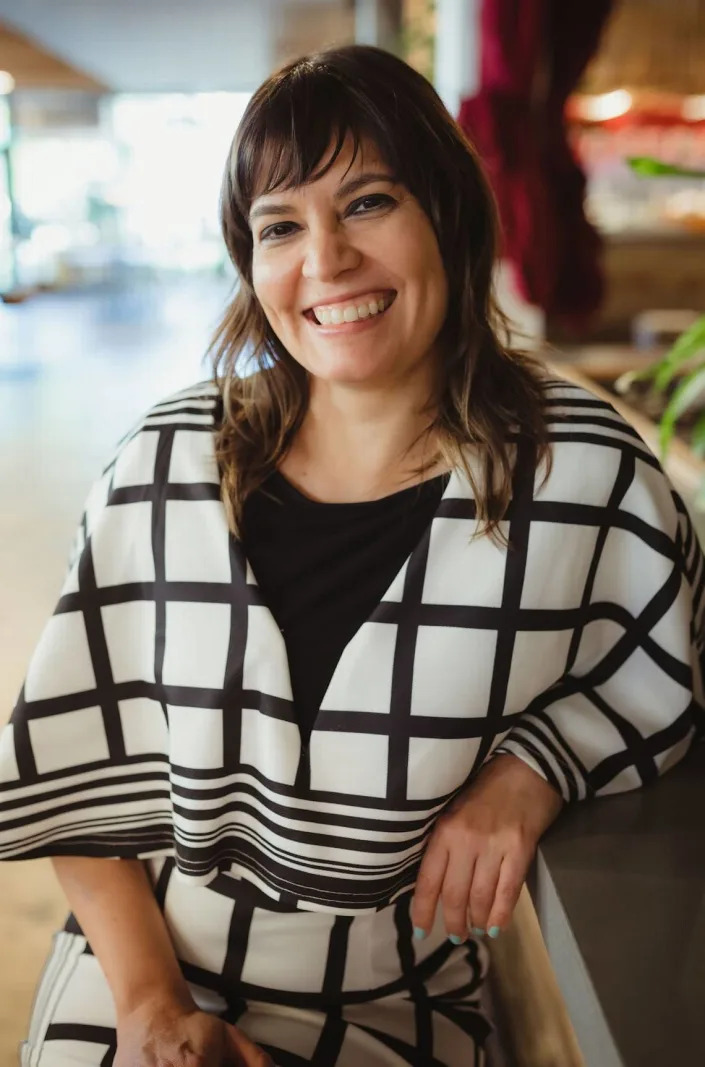
Sargalski
Trustees picked by DeSantis may change progressive college
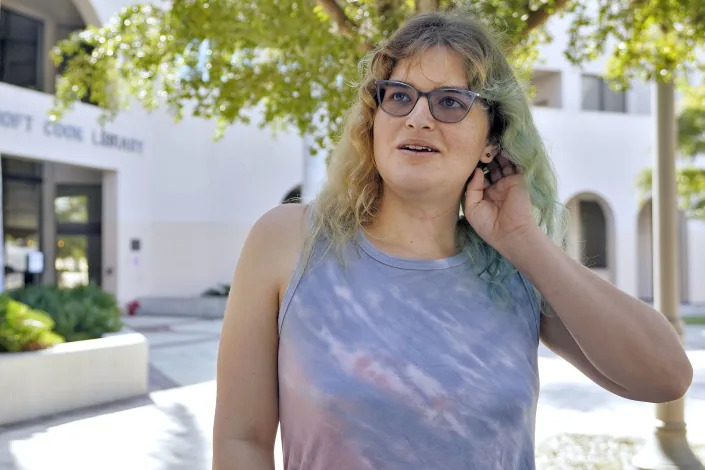
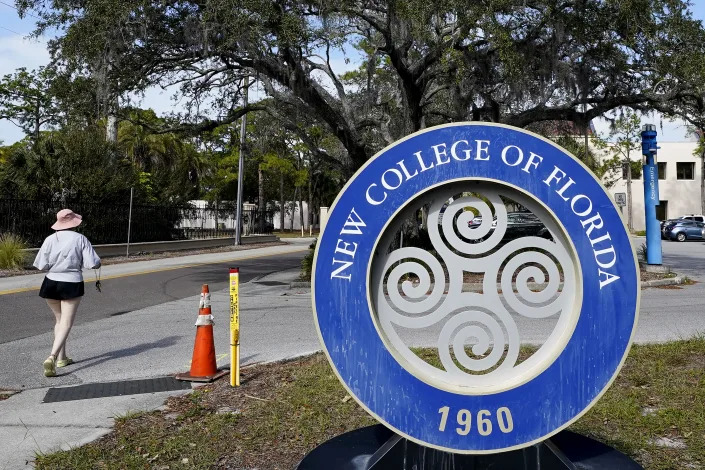

New College second-year student Sam Sharf rides a skateboard across campus Friday, Jan. 20, 2023, in Sarasota, Fla. Your education. Your way. Be original. Be you. That's how New College of Florida describes its approach to higher education in an admission brochure. The state school of fewer than 1,000 students nestled along Sarasota Bay has long been known for its progressive thought and creative course offerings that don't use traditional grades. The school founded in 1960 is also a haven for marginalized students, especially from the LBGTQ community, said second-year student Sharf in a recent interview. (AP Photo/Chris O'Meara)
CURT ANDERSON
Sun, January 29, 2023
SARASOTA, Fla. (AP) — “Your education. Your way. Be original. Be you.”
That's how New College of Florida describes its approach to higher education in an admission brochure. The state school of fewer than 1,000 students nestled along Sarasota Bay has long been known for its progressive thought and creative course offerings that don't use traditional grades.
The school, founded in 1960, is also a haven for marginalized students, especially from the LGBTQ community, said second-year student Sam Sharf in a recent interview on campus.
“There's a lot of students out there that are not allowed to be themselves in their hometowns,” said Sharf, who is transgender and identifies as a woman. “When they get to come here, they get to thrive because they really get to be themselves.”
To Sharf and others, New College's reputation as a haven for originality and individualized coursework is now threatened. Republican Gov. Ron DeSantis' recently appointed six new trustees who intend to turn the school into a classical liberal arts school modeled after conservative favorite Hillsdale College in Michigan.
One new trustee, Manhattan Institute senior fellow Christopher Rufo, said in a column on his website that the governor wants the group to accomplish what he calls “institutional recapture,” which would move New College away from such things as diversity, equity and inclusion programs and teaching of critical race theory — the idea that racism is enmeshed in U.S. society.
“Ours is a project of recapture and reinvention,” Rufo wrote, listing several ways he believes left-wing ideas have permeated universities across the country. “Conservatives have the opportunity finally to demonstrate an effective countermeasure against the long march through institutions.”
Students such as Sharf and New College faculty have begun to push back, organizing meetings to plan strategy and issuing statements against the conservative takeover.
“We support (students') fearless pursuit of knowledge, including research on race and gender,” the New College chapter of United Faculty of Florida wrote in a public statement last week. “We assert our unflagging commitment to free speech, academic integrity and the respectful exchange of different viewpoints.”
Sharf said many students worry New College will become “a quote-unquote ‘Hillsdale of the South.’ I'm not trying to be in an environment where I'm force-fed dogmatic, nationalistic, Christian education. I want to be in a place where you're free to think and learn what you want.”
The governor's appointment of the New College trustees, including a government professor at Hillsdale College, are only one part of DeSantis' effort to shift Florida's 28 state-funded institutions of higher learning in a more conservative direction. The moves come as DeSantis considers a potential 2024 presidential campaign in which education culture battles could play a prominent part, particularly in a Republican primary.
These efforts include a memo DeSantis sent to all Florida colleges and universities requiring them to list programs and staff involved in diversity, equity and inclusion, or DEI, initiatives. The governor signed legislation last April to change the accreditation method for Florida schools and heighten performance review of tenured professors.
During his second inaugural address earlier this month, DeSantis said his goal is to “ensure that our institutions of higher learning are focused on academic excellence and the pursuit of truth, not the imposition of trendy ideology.”
The presidents of all 28 Florida colleges and universities responded to DeSantis' memo on DEI initiatives with a joint statement seeking to distance their institutions from critical race theory and similar concepts. They set a Feb. 1 goal to remove any objectionable programs.
That statement says, in part, that the schools will not fund programs with the primary idea that “systems of oppression should be the primary lens through which teaching and learning are analyzed and/or improved upon.”
The presidents added that critical race theory can be taught but only “as one of several theories and in an objective manner.”
Back in Sarasota, New College has previously fended off efforts to fold it into another state school, such as Florida State University or the University of South Florida, which has a nearby campus. It was once a private school but, since 2001, has been part of the public university system.
The new trustees, on an interim basis pending Florida Senate confirmation, will join the rest of the 13-member board at a meeting Jan. 31. Students and other opponents of conservative change expect to make their views known, Sharf said.
“The vast majority of people on campus don't want this,” she said. “They would erase a lot of things on campus. I don't want to be in a place that tries to erase my existence.”



New College second-year student Sam Sharf rides a skateboard across campus Friday, Jan. 20, 2023, in Sarasota, Fla. Your education. Your way. Be original. Be you. That's how New College of Florida describes its approach to higher education in an admission brochure. The state school of fewer than 1,000 students nestled along Sarasota Bay has long been known for its progressive thought and creative course offerings that don't use traditional grades. The school founded in 1960 is also a haven for marginalized students, especially from the LBGTQ community, said second-year student Sharf in a recent interview. (AP Photo/Chris O'Meara)
CURT ANDERSON
Sun, January 29, 2023
SARASOTA, Fla. (AP) — “Your education. Your way. Be original. Be you.”
That's how New College of Florida describes its approach to higher education in an admission brochure. The state school of fewer than 1,000 students nestled along Sarasota Bay has long been known for its progressive thought and creative course offerings that don't use traditional grades.
The school, founded in 1960, is also a haven for marginalized students, especially from the LGBTQ community, said second-year student Sam Sharf in a recent interview on campus.
“There's a lot of students out there that are not allowed to be themselves in their hometowns,” said Sharf, who is transgender and identifies as a woman. “When they get to come here, they get to thrive because they really get to be themselves.”
To Sharf and others, New College's reputation as a haven for originality and individualized coursework is now threatened. Republican Gov. Ron DeSantis' recently appointed six new trustees who intend to turn the school into a classical liberal arts school modeled after conservative favorite Hillsdale College in Michigan.
One new trustee, Manhattan Institute senior fellow Christopher Rufo, said in a column on his website that the governor wants the group to accomplish what he calls “institutional recapture,” which would move New College away from such things as diversity, equity and inclusion programs and teaching of critical race theory — the idea that racism is enmeshed in U.S. society.
“Ours is a project of recapture and reinvention,” Rufo wrote, listing several ways he believes left-wing ideas have permeated universities across the country. “Conservatives have the opportunity finally to demonstrate an effective countermeasure against the long march through institutions.”
Students such as Sharf and New College faculty have begun to push back, organizing meetings to plan strategy and issuing statements against the conservative takeover.
“We support (students') fearless pursuit of knowledge, including research on race and gender,” the New College chapter of United Faculty of Florida wrote in a public statement last week. “We assert our unflagging commitment to free speech, academic integrity and the respectful exchange of different viewpoints.”
Sharf said many students worry New College will become “a quote-unquote ‘Hillsdale of the South.’ I'm not trying to be in an environment where I'm force-fed dogmatic, nationalistic, Christian education. I want to be in a place where you're free to think and learn what you want.”
The governor's appointment of the New College trustees, including a government professor at Hillsdale College, are only one part of DeSantis' effort to shift Florida's 28 state-funded institutions of higher learning in a more conservative direction. The moves come as DeSantis considers a potential 2024 presidential campaign in which education culture battles could play a prominent part, particularly in a Republican primary.
These efforts include a memo DeSantis sent to all Florida colleges and universities requiring them to list programs and staff involved in diversity, equity and inclusion, or DEI, initiatives. The governor signed legislation last April to change the accreditation method for Florida schools and heighten performance review of tenured professors.
During his second inaugural address earlier this month, DeSantis said his goal is to “ensure that our institutions of higher learning are focused on academic excellence and the pursuit of truth, not the imposition of trendy ideology.”
The presidents of all 28 Florida colleges and universities responded to DeSantis' memo on DEI initiatives with a joint statement seeking to distance their institutions from critical race theory and similar concepts. They set a Feb. 1 goal to remove any objectionable programs.
That statement says, in part, that the schools will not fund programs with the primary idea that “systems of oppression should be the primary lens through which teaching and learning are analyzed and/or improved upon.”
The presidents added that critical race theory can be taught but only “as one of several theories and in an objective manner.”
Back in Sarasota, New College has previously fended off efforts to fold it into another state school, such as Florida State University or the University of South Florida, which has a nearby campus. It was once a private school but, since 2001, has been part of the public university system.
The new trustees, on an interim basis pending Florida Senate confirmation, will join the rest of the 13-member board at a meeting Jan. 31. Students and other opponents of conservative change expect to make their views known, Sharf said.
“The vast majority of people on campus don't want this,” she said. “They would erase a lot of things on campus. I don't want to be in a place that tries to erase my existence.”

